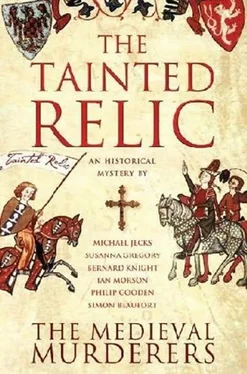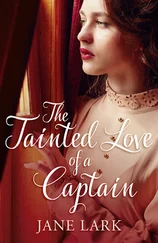But, already alarmed by the appearance of Magog (or Gog), Nightingale snatched up his lute with one hand and, still holding on to the wooden box with the other, slipped round the buttress and took to his heels. His accomplice was a second or so behind him, but he too was away before I got within twenty yards.
Nightingale and Perkin would have done better to have stood still and tried to brazen it out. Running was a sign of guilt. And even someone as dense as the constable could react to a running man, as a hound reacts to a hare. I sensed rather than saw him lumbering after us.
The ballad singer and the cutpurse would also have done better to separate so as to divide pursuit, but Perkin stuck close to Nightingale’s track. The priory lay on the north side of Smithfield and the edge of the Bartholomew ground. Indeed, this point really marked the ragged fringe of London. There were a few people about but most of the crowd was still at the heart of the fair.
Given their head start and likely practice in running, it was quite possible that the thieves might have outpaced us and made their getaway among the lanes and ditches that fanned out into the open fields of Hoxton or Islington. But suddenly, from behind the wall of an outbuilding, there sprang the other constable, Gog (or Magog). Whether he acted by instinct or whether he was more quick-thinking than I’d credited either of them with being, he stuck out his long staff so that it tangled up in Ben Nightingale’s legs. The singer, impeded by what he was carrying, stumbled and fell. His red cap flew off while his lute somersaulted into the air before crashing to the ground with an unmusical clatter. Then the constable gave him a clout over the head.
Perkin the cutpurse almost collided with his fallen companion, although he jumped to one side at the last moment and drew off to the left. But he’d lost precious seconds by the manoeuvre and, with four individuals on his tail, he didn’t stand much of a chance. Small fellow that he was, he was soon overwhelmed by all our attentions.
I left it to the others to deal with Perkin and went in search of the box, which Nightingale had also dropped as he fell. I found it on its side a few yards off. It wasn’t quite empty for, wedged in a corner, was the strip of parchment that Ulysses Hatch had claimed showed the authenticity of the fragment of the cross. The parchment was so faded, however, and the words so hard to decipher, that, by itself, this would prove little. Nevertheless, I carefully nestled the box under my arm and joined the others. Ben Nightingale was on his feet but looked as though he scarcely knew where he was-or indeed who he was. He was holding his bare head where the constable had thwacked it.
Gog and Magog looked gratified to have apprehended two more villains who had demonstrated their turpitude by fleeing. When I indicated that we should all return to Pie-Powder Court and Justice Farnaby, they seemed happy enough to fall in with the idea. On our way there, I noticed Abel pick up Nightingale’s fractured lute. For his part, the singer was still not sure what was going on and staggered forward clutching his head. Peter Perkin, meanwhile, looked crestfallen.
‘This is the singer’s means of trade,’ said Abel, cradling the lute in his arms. The neck of the instrument was splintered and the strings tangled.
‘Singer? He’s a thief-or worse,’ I said, full of righteousness that we had tracked down the individuals responsible for Hatch’s demise.
‘It will be a long time before he makes enough money to buy another of these,’ said Abel, gazing on the lute as though it were a sickly baby.
‘Then he can always steal one,’ I said, wondering at Abel’s softness. I suppose it was because he had once earned his living by trickery that he had a sneaking sympathy with unreformed cony-catchers.
We returned to the priory and to the hall where Justice Farnaby was still sitting on his oak chair, as if waiting for more malefactors to be produced. I was eager to explain that we’d come back with proof, of a sort, as to the real identity of the thieves and probable murderers of Ulysses Hatch. Wapping Doll was still there. To her especially I was eager to show that I was no murderer. I handed over the box to the Justice, describing how this was the very object I’d first seen in Hatch’s hands and then in Perkin’s possession before it was seized by Nightingale. The cutpurse looked indignant but it was for form’s sake only. Gog and Magog could add their testimony to the effect that I was telling the truth, I said, appealing to the constables.
Farnaby opened the box and took out the fragile strip of parchment. He glanced at it for an instant then shut the box once more. He looked at Nightingale, who was still clutching his battered noddle, and at Perkin. He considered, for a long period he considered.
‘Wait in there with your friends, Master Revill,’ he said, gesturing towards a door at the side of the hall. ‘Let me hear what these individuals have to say for themselves.’
Jack and Abel and I filed into a room that must have been the kitchen to the refectory. There was an open fireplace with a roasting-spit operated by a small treadmill. A dog would have turned the treadmill in the monks’ time. The equipment was old and rusted. The kitchen door was firmly closed on us. Again, if we weren’t quite prisoners we weren’t free men either. My confidence that justice was about to be done dwindled slightly.
‘Where’s this bit of the “true” cross, then?’ said Jack. ‘All that Perkin had was the box which you said it was in.’
‘That’s only what he showed Nightingale, the empty box,’ I said. ‘Most likely he’d already taken it for himself. Maybe he was planning to sell it on his own account.’
‘If it ever existed,’ said Jack. In his irritation he tried to spin the treadmill, which was connected to the spit by a sagging chain. It creaked like some ancient implement of torture.
‘I saw it, I tell you, I saw it in Ulysses Hatch’s own hands.’
‘Well, he can’t testify any longer, can he? And now it’s vanished into thin air.’
‘Nick’s not the only one to know of it,’ said Abel, coming to my rescue. ‘Justice Farnaby mentioned it. Someone must have informed him .’
‘Wapping Doll,’ I said. ‘She knew about the cross, said it brought her out in goose bumps.’
‘Then her bumps can be brought in evidence,’ said Jack. ‘Until such time we shall have to say that the cross has gone.’
‘Perhaps this can be repaired,’ said Abel, changing the subject. ‘I’m not an expert, mind…’
Abel was still holding Nightingale’s damaged lute. And, watching him, an ingenious idea flashed into my mind. I recalled the scene of the two thieves standing in the shadow of the buttress. The way in which Perkin had been fiddling with the instrument while his friend was counting out the coins in his hand. Suppose that Perkin had got the bit of sacred wood after all and did plan to keep it for himself. Suppose the plan had come to him at the very instant the two men were counting out their money in the shade of the buttress. Perkin is holding the wooden box containing the item. He’s about to surrender it to the singer when greed gets the better of him. He palms the glass vial and, almost before he’s aware of what he’s doing, slips it into a convenient hiding place instead of handing it over. Then he shows Nightingale the empty box, pretending ignorance of its contents. Meantime the glass vial and the relic are somewhere else altogether.
‘Give me the lute, Abel. I’ve got an idea.’
Abel passed me the broken instrument. The neck was cracked and splintered and some of the strings had snapped. I shook the thing. Something rattled within. I dug my hand through the sound-hole and rummaged about the interior of the lute. With mounting certainty, I grasped hold of an elongated object. It didn’t feel like glass but wood. Too late I remembered Ulysses Hatch’s warning, They say that to touch it is death . But I’d already seized the wooden piece and was easing it out of the sound-hole. The thrill of being proved right banished fears of an old wives’ curse. Like a magician, I uncurled my palm and showed Jack and Abel what it contained.
Читать дальше












